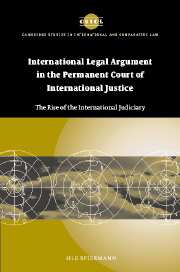 International Legal Argument in the Permanent Court of International Justice
International Legal Argument in the Permanent Court of International Justice Published online by Cambridge University Press: 17 July 2009
Conceptions of the state
Back in 1899, only a few of the positions now occupied by international lawyers had been provided for. Yet 1899 was a significant year. Governments met at the First Peace Conference at The Hague to set an example of codifying international law in treaties. They reached agreement on the establishment of the first international court of a permanent character, at least nominally – the Permanent Court of Arbitration. The nineteenth century had witnessed a remarkable growth in the number of treaties, and their subject matters, many of which were also governed by national law. In the same period constitutional democracy had spread widely. While it remained a government prerogative to represent the state internationally, for example when consenting to be bound by a treaty, parliamentary bodies had become centres of national law-making processes.
In 1899, Professor Heinrich Triepel in Völkerrecht und Landesrecht addressed the topical issue of the relationship between international and national law. It is one of the few nineteenth-century books on international law that was quoted, or at least cited, throughout the twentieth century. Triepel has been seen as the main exponent of the dualist theory, according to which national and international law are separate legal systems. One consequence of this view is that acts contrary to international law may be valid under national law, and vice versa. The systems were described by Triepel as circles that perhaps touched but never overlapped.
To save this book to your Kindle, first ensure [email protected] is added to your Approved Personal Document E-mail List under your Personal Document Settings on the Manage Your Content and Devices page of your Amazon account. Then enter the ‘name’ part of your Kindle email address below. Find out more about saving to your Kindle.
Note you can select to save to either the @free.kindle.com or @kindle.com variations. ‘@free.kindle.com’ emails are free but can only be saved to your device when it is connected to wi-fi. ‘@kindle.com’ emails can be delivered even when you are not connected to wi-fi, but note that service fees apply.
Find out more about the Kindle Personal Document Service.
To save content items to your account, please confirm that you agree to abide by our usage policies. If this is the first time you use this feature, you will be asked to authorise Cambridge Core to connect with your account. Find out more about saving content to Dropbox.
To save content items to your account, please confirm that you agree to abide by our usage policies. If this is the first time you use this feature, you will be asked to authorise Cambridge Core to connect with your account. Find out more about saving content to Google Drive.